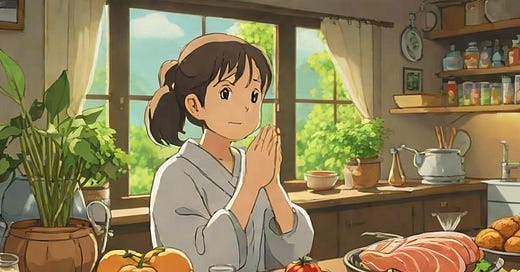Itadakimasu: Thanks for the Food - Japanese
Division of time, celebrating with hope and optimism, and what it is that makes a year
Humans need “to divide” in order to understand. We have to break up a big whole, then break it into even smaller parts, make it as small as possible, and then understand each part. This is the same for either deduction or induction. Wholes and parts. We approach time with exactly such a need for dividing to understand.
Our limited minds need compartmentalization in order to understand an infinite universe of time—time that we see as linear but that is probably an infinite-dimensional universe. That's why we have centuries, decades, years, months, weeks, and days. Each piece of time that we divide up feels to us like a “small model of life." We start each one with new expectations, hope, aspirations, and sometimes ceremonies.
Every time a new year approaches, I think: Why is the beginning of the year at this time? Of course, I know it's because we all use the Gregorian calendar, but let me make clear what I mean:
As we move from one year to the next, what is that ingredient that will make us different from the previous year, and what is it that gives us so much hope?
Is there something extraordinary that happens that makes us different from the person we were a few minutes ago, and I miss it? Many times I observe myself as midnight approaches, and I compare myself with the person I was a few minutes after midnight, and the result is disappointment. Because I am waiting for a very new and fresh change inside me, but that magic touch never comes, even though I look in every hole inside me.
I am not a pessimist at all. In fact, I think I am a big optimist. I believe in the future more than in the past, and I believe in the power within me to create it. But Santa's magic touch has never touched me.
Do you know when the new year is for me? September.
Why? Because at the end of spring, a period when we work and produce together begins to slow down, vacation plans begin with the summer heat, and sometimes long and sometimes short breaks are taken. In the summer months, people celebrate what they have accomplished in the past three quarters with half-idleness, rest, and prepare for a new period of work. Summer means a slow life for most of us.
September is the time to leave the summer behind, to prepare for a new period of work and production with a rested body and mind. That's why September is the new year for me. I make my annual plans in September, and January is just an excuse to have a good time with other people. I obey them, have fun with them, give gifts, receive gifts, decorate pine trees. I give thanks for the happy moments and get filled with gratitude.
Gratitude is a vital feeling. A person should be filled with gratitude every day if possible. They should make special time for filling the life with gratitude. They can write it down in a notebook, repeat it while walking down the street, pray while washing the dishes, sing with thankful feelings. This is what enriches one's life the most.
I find it meaningful to end the year 2023 with a word that reminds us to be thankful. Itadakimasu is a phrase that our Japanese friends say while putting their palms together right in front of their faces just before they start eating. Like “bon apetit” or “afiyet olsun” in Turkish. I am sure this ritual exists in many other languages. And I am glad that it exists. At least we have an excuse to be thankful every day.
I wish everyone a new period full of gratitude, hope, love, meaning and fulfillment.
Till next week,
— Gulsun
Thank you for taking the time to accompany me in the story of a new word. Every word of the world’s languages is also ours, belonging to humanity while giving us an essence of the culture in which it was rooted.
We are made of stories—that is, of words.




